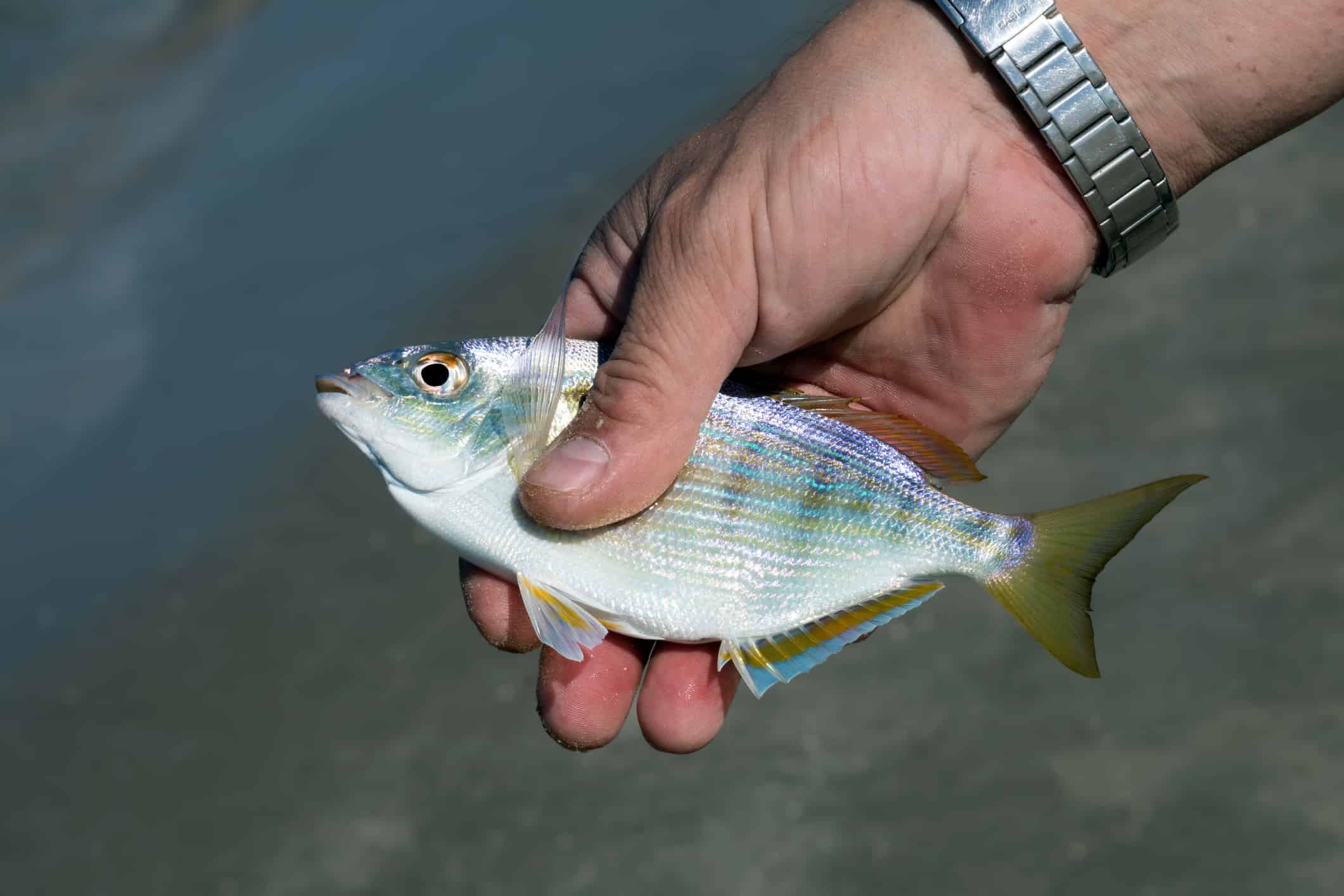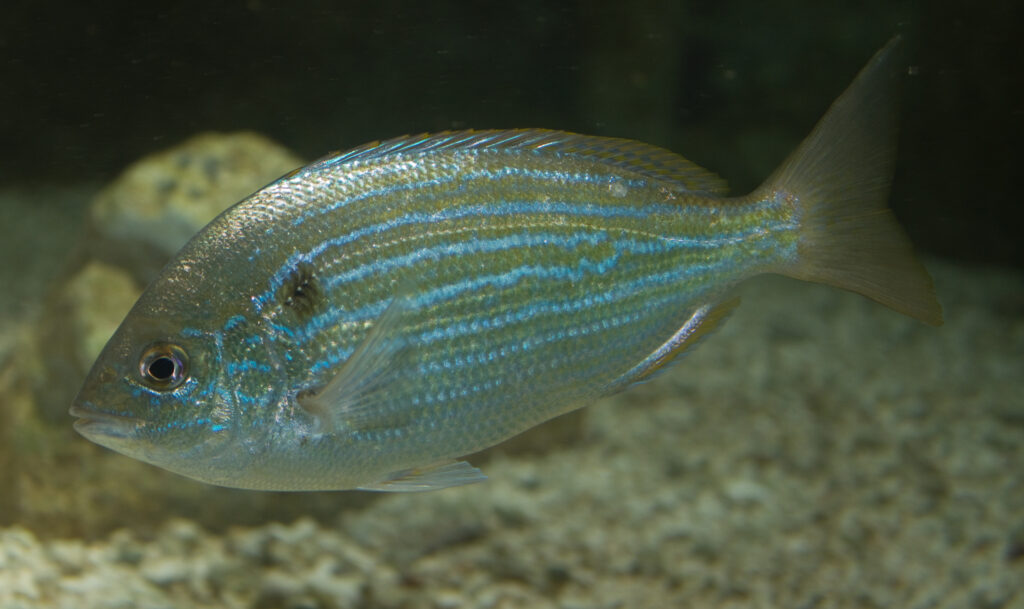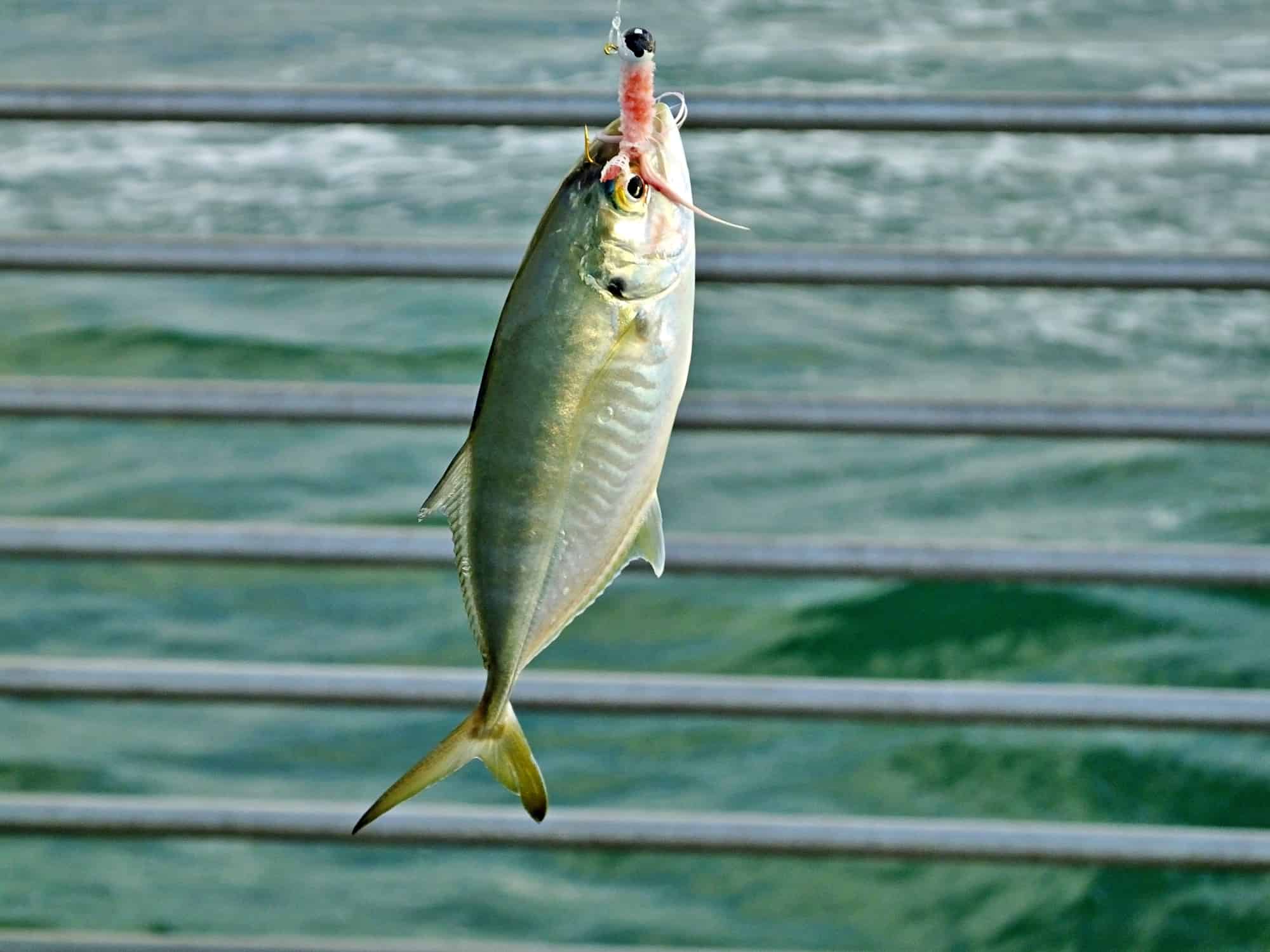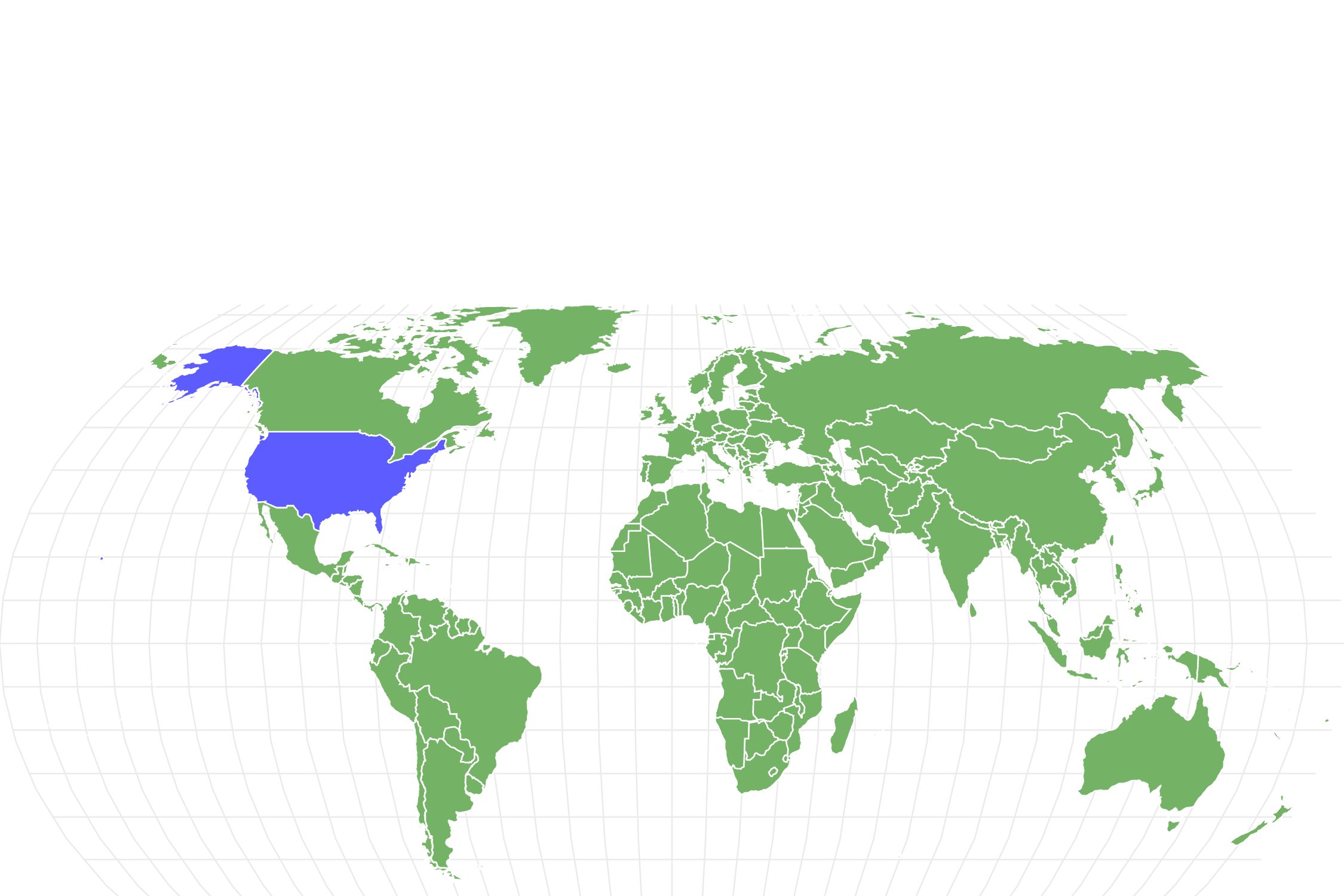Pinfish
Lagodon rhomboides
Pinfish make loud croaking sounds during their spawning season.
Advertisement
Pinfish Facts
- Prey
- crabs and shrimp
- Name Of Young
- fry
- Fun Fact
- Pinfish make loud croaking sounds during their spawning season.
- Estimated Population Size
- estimated global population of 200-300 million Pinfish.
- Biggest Threat
- Sharks, dolphins, and birds like egrets also prey on them
- Other Name(s)
- Pin perch, sand perch, and butterfish
View all of the Pinfish images!
A small marine fish known as the pinfish lives along the Gulf and Atlantic coasts of the United States. This fish species has an oval-shaped body and can reach lengths up to 4.5 inches. They are green and yellow in color and shine in grassy, shallow waters. Since this fish is frequently used as bait to catch larger fish species, it has become increasingly popular among fishermen. The growth ring pattern seen down the length of this species’ body, resembling a row of pins, is what makes this fish unique. Anglers with experience will find it simple to identify this particular fish even from a distance because of its distinctive pattern.
Species of Pinfish
There are two known species of pinfish, namely Lagodon rhomboides, found in the Atlantic Ocean from Nova Scotia to Argentina, and Diplodus argenteus found throughout the Mediterranean Sea. They belong to a family of ocean-dwelling fish called Sparidae. Both species have elongated bodies where their scales display distinctive black spots on them.
4 Pinfish Facts
- Other names for the pinfish include butterfish, sand perch, and pin perch.
- Adults feed mainly on invertebrates such as crabs and shrimp. However, young pinfish feed on small fish fry and aquatic plants like seagrass.
- They make loud croaking sounds during their spawning season.
- This fish can rapidly change colors depending on temperature changes or mood, ranging from a light yellow-green to brown or grey with blue or black stripes along their sides when disturbed or hostile towards other fish species competing for food sources in an area.
Scientific name and Classification
The pinfish, known by its scientific name Lagodon rhomboides, is classified as an Actinopterygii species. It belongs to the family Sparidae of order Perciformes.
Pinfish Appearance
The pinfish is a small fish, typically measuring between 4 and 6 inches in length. Its body is long and slender, with a pointed snout and a broad, flat head. Their coloration is a mix of yellow, green, and blue, with a white belly and black stripes on its sides. Its fins are short and rounded, and its tail is forked. The pinfish also has two large eyes set close together on its head.
In addition, the pinfish has a unique set of scales arranged in a diamond pattern. These scales are small and smooth and arranged in rows along the length of the fish’s body. Its markings can sometimes be very faint when its fry is young but become more prominent as it matures. It also has two barbels on either side of its mouth which guide them in the direction of locating food.

The pinfish is a small fish measuring 4-6 inches in length, with a mix of yellow, green, and blue coloring.
©iStock.com/irin717
Distribution, Population, and Habitat of the Pinfish
Most recently, pinfish have been documented to swim as far north as Virginia and south of Texas. Reports show that they are also found along the eastern coast of Florida and especially around the Keys. Additionally, there is evidence that pinfish can be found in brackish estuaries from Maryland down to Mexico.
Population
The estimated global population of pinfish is 200-300 million. Environmental experts believe that the increase is due to increased water temperatures and a decrease in predatory species.
Habitat
Shallow coastal waters are the habitat of the pinfish. They are also close to vegetated shorelines in protected bays and estuaries. This fish species favor locations where there is a plentiful supply of herbivorous prey and cover from predators.

Pinfish can rapidly change colors depending on temperature changes or mood.
©Brian Gratwicke / Flickr – License
Predators and Prey
Some kinds of large fish, such as grouper, sea bass, and snook, are predators of pinfish. Sharks, dolphins, and birds like egrets also prey on them. Other small fish that live in the same area, like jacks, grunts, and wrasses, depend on smaller pinfish for food. Because they are easy prey in shallow estuarine conditions, smaller juveniles are targeted and eaten by marine animals.
Reproduction and Lifespan
The reproduction process for a pinfish begins when the water temperature outside reaches 70 degrees Fahrenheit. First, the fish will congregate in shallower waters to spawn, and each female can release anywhere from 5,000-80,000 eggs at once. After spawning, males guard the developing eggs while attached to vegetation or other structures on the bottom of the ocean floor. Once they hatch after two to three days, they feed off small crustaceans and zooplankton until they mature into adults.
Reproduction in pinfish is a complex process that involves both external and internal fertilization. External fertilization occurs when the male pinfish releases sperm into the water. Internal fertilization occurs when the male releases sperm directly into the female’s body. The eggs become fertilized and released into the water, where they develop into larvae. The larvae then mature into adults, and the cycle is complete.
Pinfish can live up to five years in the wild. Pinfish are a popular species for recreational anglers, and their short lifespan makes them a sustainable target for fishing. In captivity, pinfish can live up to 8 years with proper care.
Fishing for Pinfish
To catch a pinfish, one can use various techniques, including:
- Jigging
- Casting
- Trolling
- Drift fishing
Jigging is a popular technique for catching pinfish, as it allows you to quickly and easily cover a wide area of water. When jigging for pinfish, small pieces of bait such as shrimp can be attached to a light jig head. When casting, use a light spinning rod, reel, and a small jig head with a bait of your choice.
Drift fishing is also a great way to target pinfish, as it allows you to cover a large area of water with minimal effort. When drift fishing, use a light spinning rod and reel, a small jig head, and a bait of your choice. Using a proper fishing technique, you can easily catch pinfish in no time.

Pinfish are a popular species for recreational anglers, and their short lifespan makes them a sustainable target for fishing.
©iStock.com/passion4nature
Cooking Pinfish
Cooking pinfish is a simple process that yields delicious results. To prepare, start by seasoning the fish with salt and pepper, then lightly coat it in flour. Add garlic, lemon juice, or herbs and spices to the flour mixture for added flavor. Cook your fish on each side until the fish is golden brown. Serve the pinfish with a side of vegetables, rice, or potatoes for a complete meal.
View all 192 animals that start with PPinfish FAQs (Frequently Asked Questions)
What color is a pinfish?
Its coloration is a mix of yellow, green, and blue, with a white belly and black stripes on its sides.
How many eggs can a female pinfish spawn?
Female pinfish can release anywhere from 5,000-80,000 eggs at once.
What is the lifespan of a pinfish?
Pinfish can live up to five years in the wild. Pinfish are a popular species for recreational anglers, and their short lifespan makes them a sustainable target for fishing. In captivity, pinfish can live up to 8 years with proper care.
Thank you for reading! Have some feedback for us? Contact the AZ Animals editorial team.
Sources
- Texas Parks and Wildlife, Available here: https://tpwd.texas.gov/huntwild/wild/species/pinfish/
- Live Advantage Bait, Available here: http://liveadvantagebait.com/pinfish
- Guidesly, Available here: https://guidesly.com/fishing/fish-species/pinfish

















